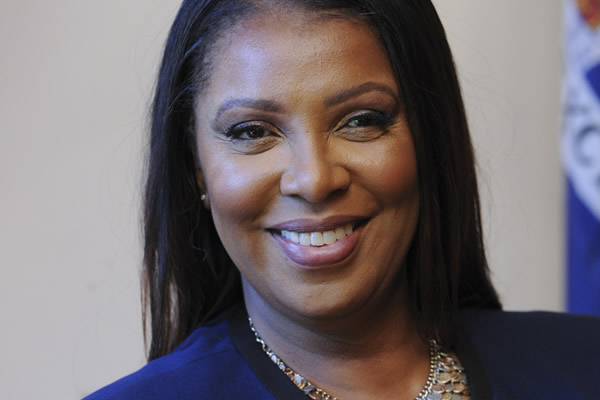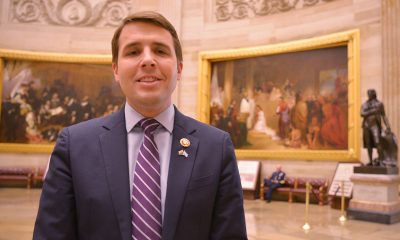National
DOJ seeks time to argue for anti-gay baker in Supreme Court case
Trump administration claims ‘a substantial interest’ to argue in the case

The Justice Department under Attorney General Jeff Sessions is seeking time to argue before the Supreme Court on behalf of an anti-gay baker. (Photo by Gage Skidmore; courtesy Wikimedia Commons)
U.S. Solicitor General Noel Francisco filed the two-page request Wednesday before the Supreme Court in the case of Masterpiece Cakeshop v. Colorado Civil Rights Commission.
The request says the Justice Department “has a substantial interest” in the case because the U.S. government has an interest in “the preservation of federal constitutional rights of free expression.”
Jack Phillips, the Colorado baker, bases the argument that he can defy Colorado’s non-discrimination law and refuse wedding cakes to same-sex couples based on the First Amendment right to freedom of expression.
The request also argues the U.S. government has an interest in the case because the scope of Colorado non-discrimination law, which bars anti-gay discrimination in public accommodations, is similar to Title II of the Civil Rights Act of 1964.
“The United States is thus well positioned to address the reconciliation of content-neutral public accommodations laws with federal constitutional freedoms of speech and expression,” the request says. “Participation by the United States in oral argument would therefore materially assist the Court in its consideration of this case.”
As noted in the request, the Justice Department has already filed a friend-of-the-court brief in the case arguing that baking a wedding cake is inherently an act of expression protected under the First Amendment. Therefore, the ability of a baker to deny a wedding cake to same-sex couples for religious reasons should trump any state non-discrimination law.
The case came about after Phillips refused to make a wedding cake for Charlie Craig and David Mullins, a Colorado same-sex couple, in 2012 for their wedding in Massachusetts. An administrative judge ruled in favor of the same-sex couple — a decision the Colorado Court of Appeals upheld in 2015.
Although the Colorado Supreme Court had declined to review these decisions and let them stand, the U.S. Supreme Court granted a writ of certiorari, or agreed to take up the case, in June.
Oral arguments are set for Dec. 5.
Federal Government
Mass HHS layoffs include HIV/AIDS prevention, policy teams
Democratic states sue over cuts

Tuesday began a series of mass layoffs targeting staff, departments, and whole agencies within the U.S. Department of Health and Human Services under Secretary Robert F. Kennedy Jr., who reportedly plans to cut a total of 10,000 jobs.
On the chopping block, according to reports this week, is the Office of Infectious Disease and HIV/AIDS Policy. A fact sheet explaining on the restructuring says “a new Administration for a Healthy America (AHA) will consolidate the OASH, HRSA, SAMHSA, ATSDR, and NIOSH, so as to more efficiently coordinate chronic care and disease prevention programs and harmonize health resources to low-income Americans.”
The document indicates that “Divisions of AHA include Primary Care, Maternal and Child Health, Mental Health, Environmental Health, HIV/AIDS, and Workforce, with support of the U.S. Surgeon General and Policy team.”
“Today, the Trump administration eliminated the staff of several CDC HIV prevention offices, including entire offices conducting public health communication campaigns, modeling and behavioral surveillance, capacity building, and non-lab research,” said a press release Tuesday by the HIV + Hepatitis Policy Institute.
The organization also noted the “reassignments” of Jonathan Mermin, director of the National Center for HIV, Viral Hepatitis, STD, and TB Prevention, and Jeanne Marrazzo, director of the National Institutes of Health’s National Institute of Allergy and Infectious Diseases. Both were moved to the Indian Health Service.
“In a matter of just a couple days, we are losing our nation’s ability to prevent HIV,” said HIV + Hepatitis Policy Institute Executive Director Carl Schmid. “The expertise of the staff, along with their decades of leadership, has now been destroyed and cannot be replaced. We will feel the impacts of these decisions for years to come and it will certainly, sadly, translate into an increase in new HIV infections and higher medical costs.”
The group added, “We are still learning the full extent of the staff cuts and do not know how the administration’s announced reorganization of HHS will impact all HIV treatment, prevention, and research programs, including President Trump’s Ending the HIV Epidemic initiative,” but “At the moment, it seems that we are in the middle of a hurricane and just waiting for the next shoe to drop.”
A group of 500 HIV advocates announced a rally planned for Wednesday morning at 8 a.m., at the U.S. Capitol lawn across from the Cannon House Office Building, which aims to urge Congress to help stop the cuts at HHS.
“Over 500 advocates will rally on Capitol Hill and meet with members of Congress and Hill staff to advocate for maintaining a strong HIV response and detail the potential impact of cuts to and reorganization of HIV prevention and treatment programs,” the groups wrote.
The press release continued, “HHS has stated that it is seeking to cut 10,000 employees, among them 2,400 CDC employees, many doing critical HIV work. It also seeks to merge HIV treatment programming into a new agency raising concerns about maintaining resources for and achieving the outstanding outcomes of the Ryan White HIV/AIDS Program.”
On Tuesday a group of Democratic governors and attorneys general from 23 states and D.C. filed a lawsuit against HHS and Kennedy seeking a temporary restraining order and injunctive relief to halt the funding cuts.
U.S. Centers for Disease Control and Prevention withdrew approximately $11.4 billion in funding for state and community health departments during the COVID-19 pandemic response, along with $1 billion to the Substance Abuse and Mental Health Services Administration.
“Slashing this funding now will reverse our progress on the opioid crisis, throw our mental health systems into chaos, and leave hospitals struggling to care for patients,” New York Attorney General Letitia James said.
State Department
Former US envoy for global LGBTQ, intersex rights slams Trump
Former President Joe Biden appointed Jessica Stern in 2021
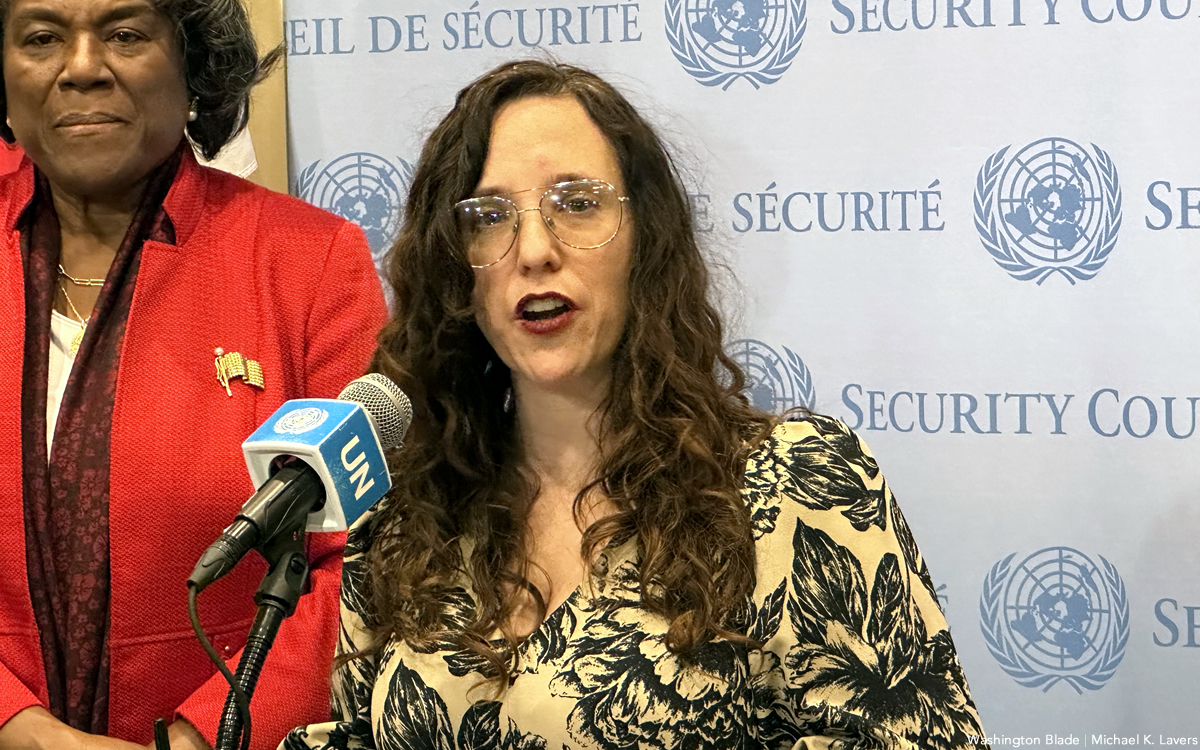
Jessica Stern, the former special U.S. envoy for the promotion of LGBTQ and intersex rights, says the work that she and her colleagues did under the Biden-Harris administration is “being systematically dismantled.”
“As the person who was responsible for leading U.S. foreign policy on LGBTQI+ issues, it’s been very difficult for the past two months to see that work being systematically dismantled,” she told the Washington Blade on March 19 during a telephone interview.
Stern was the executive director of Outright International, a global LGBTQ and intersex advocacy group, when then-President Joe Biden appointed her in June 2021.
The promotion of LGBTQ and intersex rights was a cornerstone of the Biden-Harris administration’s overall foreign policy. These efforts specifically included the decriminalization of consensual same-sex sexual relations and marriage equality efforts in countries where activists said they were possible through the legislative or judicial processes.
The Trump-Vance administration’s decision to freeze most U.S. foreign aid spending for at least 90 days has had a devastating impact on the global LGBTQ and intersex rights movement. President Donald Trump’s executive order that bans the State Department from issuing passports with “X” gender markers has prompted Germany and several other European countries to issue travel advisories for transgender and nonbinary people who are planning to visit the U.S.
Stern said the Trump-Vance administration “has studied the anti-LGBTQI strategies of other countries and basically imported the worst ideas from around the world: The most violent, the most dehumanizing, the most targeting strategies.” Stern added these policies have emboldened Hungarian Prime Minister Viktor Orbán, Russian President Vladimir Putin, Argentine President Javier Milei and other anti-LGBTQ heads of state.
“It’s one thing when a small country that has limited global reach implements anti-LGBTQI laws and policies. It’s another thing when one of the world’s superpowers does so,” Stern told the Blade. “There’s no question that the U.S.’s regression on LGBTQI rights is actually going to accelerate backlash against LGBTQI people around the world.”
“We provide political legitimacy to those ideas, but also we’re forging new alliances and coalitions, and we’re pushing these ideas on other countries,” she added. “So, it’s not a passive action. The U.S. government currently is actively funding and disseminating anti-LGBTQI hatred around the world.”
Former State Department colleagues ‘afraid every day’
The Trump-Vance administration in a Feb. 3 statement that defended its efforts to dismantle the U.S. Agency for International Development noted examples of the organization’s “waste and abuse” included $2 million for “sex changes and ‘LGBT activism'” in Guatemala and $1.5 million to “advance diversity, equity and inclusion in Serbia’s workplaces and business communities.” Secretary of State Marco Rubio last month said 83 percent of USAID contracts have been cancelled, and the remaining will “now be administered more effectively under the State Department.”
Rubio after the Trump-Vance administration froze nearly all U.S. foreign aid spending issued a waiver that allowed the President’s Emergency Plan for AIDS Relief and other “life-saving humanitarian assistance” programs to continue to operate.
The Blade has previously reported PEPFAR-funded programs in Kenya, South Africa, and elsewhere have suspended services and even shut down because of a lack of U.S. funding. UNAIDS Executive Director Winnie Byanyima on March 24 said 6.3 million more people around the world will die of AIDS-related complications over the next four years if the U.S. does not fully restore its foreign assistance.
Stern said her former State Department colleagues are “afraid every day.”
“They never know, ‘Am I going to be fired today?’ “Am I going to be put on administrative leave?’,” she said. “I cannot even imagine what it’s like to go to work every day.”
Stern told the Blade her former colleagues tell her that “there’s not a lot of foreign policy work happening because there’s so much disruption being caused by DOGE (the Department of Government Efficiency).”
“Entire departments have been decimated,” she said, noting one of them has lost 60 people. “It’s almost inconceivable to figure out how to restructure your work when your resources have been decimated.”
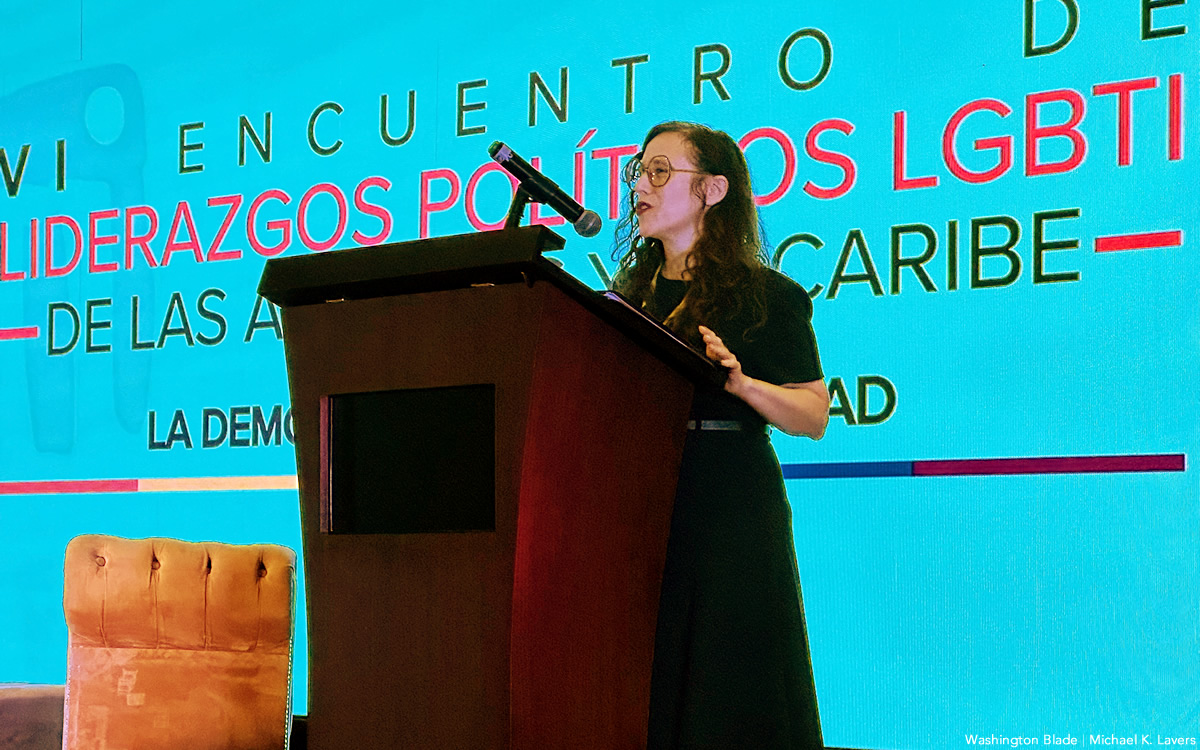
Stern described herself as “an eternal optimist” when the Blade asked whether she thinks the U.S. can ever stand for LGBTQ and intersex rights abroad.
“You have to believe in human rights,” she said.
Stern said former Secretary of State Antony Blinken as “an ally on LGBTQI issues.” Stern also said many of her now former State Department colleagues thanked her and her team for their work before they left government.
“There’s so much compassion from straight and cisgendered allies, from career officials, people that are not human rights experts or specialists, people that don’t focus on the well-being of LGBTQI people, but people that care very much about the United States standing for its values, the rule of law, equality for all, and this notion that it is in our national interest to ensure that there is safety, prosperity, and well-being for people around the world,” she said.
“The situation we find ourselves in will not last forever,” added Stern. “What we have to do is figure out how to hold the line right now, and how to organize for the future.”
She stressed ways to “hold the line” include litigation, protests, letters-to-the-editor, demanding accountability from lawmakers.
“There’s so much to do,” said Stern.
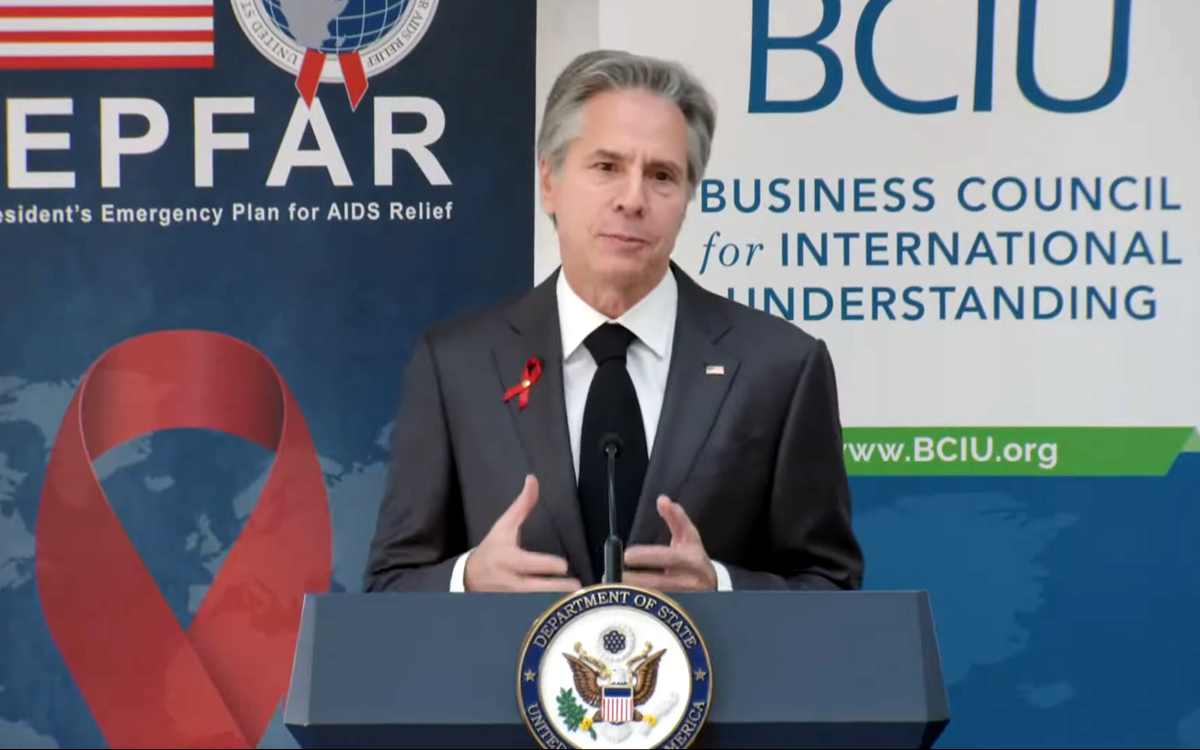
Stern is currently teaching at Columbia University’s School of International and Public Affairs, and is writing about her experience as the “first-ever human rights expert to be the special U.S. envoy for LGBTQI rights.” Stern also told the Blade that she is working to launch a new organization.
“I love being an activist again,” she said. “If there was ever a time when activists are needed, it’s now.”
“I am really proud to have rejoined the resistance,” added Stern.
National
Destination Tomorrow works to empower LGBTQ community
Sean Coleman is Black transgender man who founded group in 2009
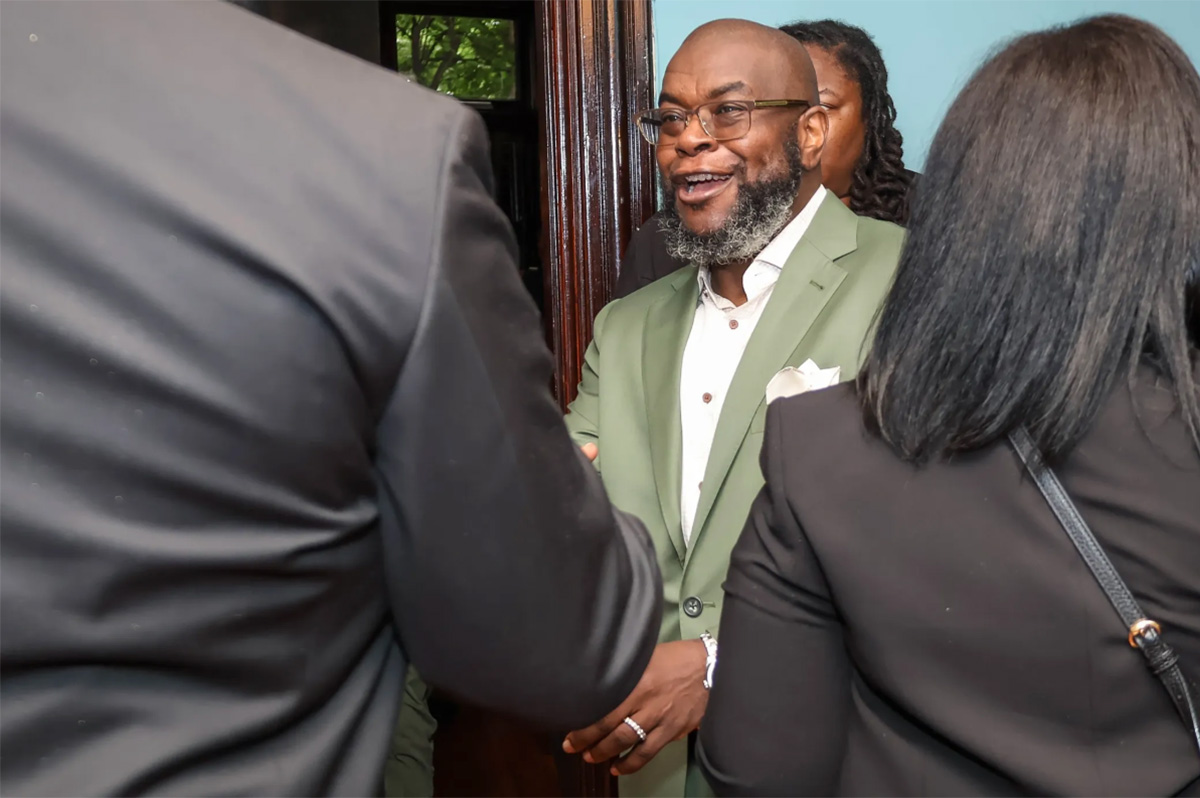
Sean Ebony Coleman became the first transgender African American to own and operate an LGBTQ center with the founding of Destination Tomorrow in 2009. Subsequent centers opened up in Atlanta in 2022 and D.C. in 2024.
Destination Tomorrow was founded on the idea that “it is more helpful to empower our most vulnerable TLGBQ+ community members in a way that takes them off the path of needing emergency care.”
“Our organization emphasizes economic, social, and mental empowerment through a variety of holistic educational, financial, support-based, housing, and health programs,” Destination Tomorrow said on the organization’s website.
With Transgender Day of Visibility today and WorldPride coming to D.C. this June, the Washington Blade spoke with Coleman to get some further insight into how Destination Tomorrow and other organizations are responding to the pressure the Trump-Vance administration is putting on the LGBTQ community.
BLADE: What was the overall reaction to the Trump administration and the heavy anti-LGBTQ rhetoric being pushed by the administration from Destination Tomorrow?
COLEMAN: I think the first thing was disbelief, right? You know he’s not well versed, but the embellishments about the community, particularly the trans community, were so outlandish that they became dangerous. So I think the first thing was, people actually believe this, and we have a message in problem because we’re not responding. We really missed an opportunity to message that differently. Like some of them it was so easy for us to respond and say, “We’re talking about the entire sports world when it comes to college and high school” and those kinds of things, right? We are definitely focusing on the wrong one percent.
I knew it was like collectively as a trans man, just personally, I was like “okay, so how do you show up now?” You’re in a position that folks expect you to at the very least have something positive to say next steps, this is what we’re gonna do, marching all this, whatever. I’m sitting with it like, no, I’m a little nervous. In the moment, most of the danger and most of the rhetoric is happening towards trans and gender nonconforming people and unfortunately, Black and brown and trans and gender nonconforming folks feel it worse when things like this happen.
BLADE: With a lot of organizations getting threats, losing funding, and everybody just being scared, has Destination Tomorrow specifically received any higher amounts of traffic to your locations, either here or other states?
COLEMAN: All three locations have seen an uptick. Funny thing a lot of them are coming in because they just want community. and we do that intake assessment. Then we say “while we have you here, we could do all of these other things.” But it’s really about them coming for community. If you know anything about us, we’re well versed in the house and ballroom community. So we put on balls. We’re planning one now.
And the young people, particularly young trans people, are also coming in for the ball, but they also want to know. Mr. Coleman, what can we do now? What is it? They want a call to action, want to be motivated and I think we have to figure out again this one message of where we’re going to go. Whether it is New York, Atlanta, and D.C., Destination Tomorrow is then going through all of the other trans into the nonconforming organizations. Speaking in one voice and figuring out what movement building looks like for us in this moment and we think that young people should drive it.
Particularly in New York and D.C. will receive some additional resources because we want to be able to address those folks that are going to come in. We want to make sure (to have enough) staff, (increase) our hours. We increase our security and our security presence because that was something that we were concerned about, even if it’s just an in person meeting that we’ve been doing for the last five years, because how do we keep those meetings and that meeting space and our identity safe?
BLADE: Do you feel like given the recent federal government layoffs and this whole Trump takeover of Washington, like, do you think D.C. is prepared or safe enough to start implementing those things that you want to try and get done?
COLEMAN: Yes. I think once we’ve taken a moment to step back and assess the situation, we will be able to come out stronger with the initiative that is going to be most important and most impactful for our community, but I think it is going to take some collaborative effort. I don’t think one agency is gonna be able to do it. I think this is a time for collaboration and allies. um, and not in that order. Right? But D.C. is definitely a safe place for LGBT community members worldwide.
It’s gonna be an amazing time. We’re gonna get an opportunity to show how resilient our community is, how much love we still receive. If you look at some things on social media, it’ll seem like everyone’s demonizing the trans and general nonconforming community and that’s not necessarily the case, right? I think we get sucked into this vacuum with social media and I think once you log off and you actually go outside, you recognize exactly how much support you have from your community. And I think that ties back into our messages. We’re not going to stand around sad and defeated. We’re going to show up, have a good time with WorldPride.
I also see it as an excellent opportunity to strategically put some plans in place. While we have you here, and we’re celebrating, we’re partying, but here is what our next steps will be. We have at least two or three next steps that collectively, you can go back down and all of us a picture goes saying two or three things. Say the same things, stay on message and I think World Pride will be an excellent opportunity to do so.
Along with the comments on TDOV and WorldPride, Coleman also spoke about the current state of LGBTQ politics.
“What’s so unfortunate for me is that we lean into our allies, right? Now is the time for our allies to take a look around the room and say “Oh wait. This person is missing [in the conversation], we should not be speaking on behalf of Black and brown people,” he told the Blade. “I specifically say Black and brown trans people. [Allies] shouldn’t be speaking on behalf of them because I know a few that can actually come here and speak on their own behalf and unfortunately it doesn’t happen. I think it’s because it’s tied into the losing funding across the board. So those LGB organizations are gonna feel that loss. And at some point they may feel like they have to step in and fill a void that they don’t necessarily have to because we’re here.”
Specifically in New York, Coleman has been looking toward the local government to help Destination Tomorrow and other organizations stay protected and operational during times like these.
“Trans, gender nonconforming and LGB issues go across different issues. Whether we’re talking about housing, criminal justice reform, or reproductive rights. We should be included in those discussions, and we should be included in those funding opportunities,” said Coleman. “And I think this gives us an opportunity to show that Destination Tomorrow has a program called Pride at Work. to the workforce development program, where we’re pitching it in D.C. and we’re actually in our third year of doing it in New York City. That’s an example of how workforce development should be for all of us, right?”
“So a lot of the work we’ve done in the last couple of months is really meeting with all our elected officials and saying, ‘This is the message that we’d like you to push. This is what we want to say, this is how we feel. Because you are not saying it, it feels like you left us behind. This is where you are missing the mark and it is up to you to fix it,’” he added.
A discussion for New York mayoral candidates took place later that evening. One of the things that Coleman wanted to heavily iterate to the candidates was that “at the end of the day, we’re paying attention now. We may not have been as politically engaged as we should have been, but we are now.”



